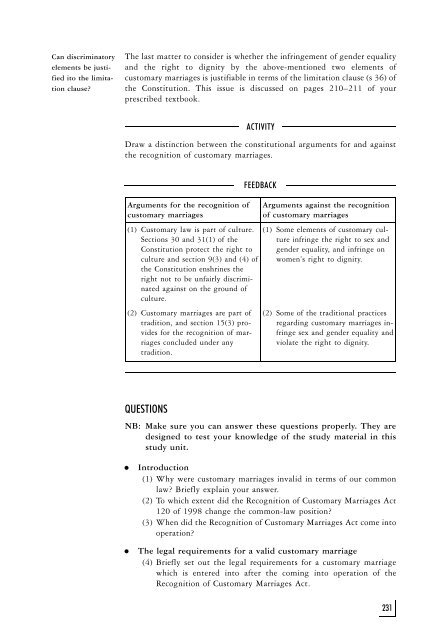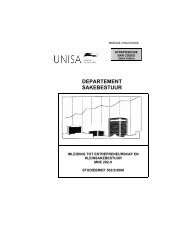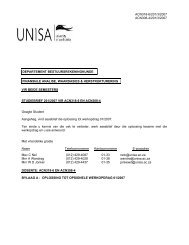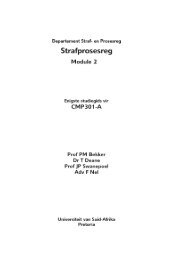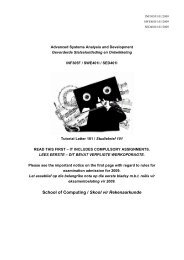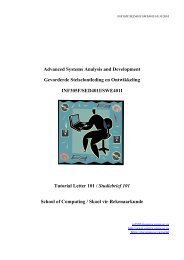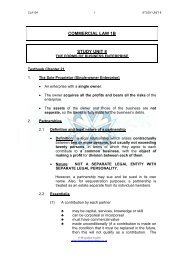key to the study guide - Name
key to the study guide - Name
key to the study guide - Name
Create successful ePaper yourself
Turn your PDF publications into a flip-book with our unique Google optimized e-Paper software.
Can discrimina<strong>to</strong>ry<br />
elements be justified<br />
i<strong>to</strong> <strong>the</strong> limitation<br />
clause?<br />
The last matter <strong>to</strong> consider is whe<strong>the</strong>r <strong>the</strong> infringement of gender equality<br />
and <strong>the</strong> right <strong>to</strong> dignity by <strong>the</strong> above-mentioned two elements of<br />
cus<strong>to</strong>mary marriages is justifiable in terms of <strong>the</strong> limitation clause (s 36) of<br />
<strong>the</strong> Constitution. This issue is discussed on pages 210±211 of your<br />
prescribed textbook.<br />
ACTIVITY<br />
Draw a distinction between <strong>the</strong> constitutional arguments for and against<br />
<strong>the</strong> recognition of cus<strong>to</strong>mary marriages.<br />
Arguments for <strong>the</strong> recognition of<br />
cus<strong>to</strong>mary marriages<br />
FEEDBACK<br />
(1) Cus<strong>to</strong>mary law is part of culture.<br />
Sections 30 and 31(1) of <strong>the</strong><br />
Constitution protect <strong>the</strong> right <strong>to</strong><br />
culture and section 9(3) and (4) of<br />
<strong>the</strong> Constitution enshrines <strong>the</strong><br />
right not <strong>to</strong> be unfairly discriminated<br />
against on <strong>the</strong> ground of<br />
culture.<br />
(2) Cus<strong>to</strong>mary marriages are part of<br />
tradition, and section 15(3) provides<br />
for <strong>the</strong> recognition of marriages<br />
concluded under any<br />
tradition.<br />
QUESTIONS<br />
Arguments against <strong>the</strong> recognition<br />
of cus<strong>to</strong>mary marriages<br />
(1) Some elements of cus<strong>to</strong>mary culture<br />
infringe <strong>the</strong> right <strong>to</strong> sex and<br />
gender equality, and infringe on<br />
women's right <strong>to</strong> dignity.<br />
(2) Some of <strong>the</strong> traditional practices<br />
regarding cus<strong>to</strong>mary marriages infringe<br />
sex and gender equality and<br />
violate <strong>the</strong> right <strong>to</strong> dignity.<br />
NB: Make sure you can answer <strong>the</strong>se questions properly. They are<br />
designed <strong>to</strong> test your knowledge of <strong>the</strong> <strong>study</strong> material in this<br />
<strong>study</strong> unit.<br />
. Introduction<br />
(1) Why were cus<strong>to</strong>mary marriages invalid in terms of our common<br />
law? Briefly explain your answer.<br />
(2) To which extent did <strong>the</strong> Recognition of Cus<strong>to</strong>mary Marriages Act<br />
120 of 1998 change <strong>the</strong> common-law position?<br />
(3) When did <strong>the</strong> Recognition of Cus<strong>to</strong>mary Marriages Act come in<strong>to</strong><br />
operation?<br />
. The legal requirements for a valid cus<strong>to</strong>mary marriage<br />
(4) Briefly set out <strong>the</strong> legal requirements for a cus<strong>to</strong>mary marriage<br />
which is entered in<strong>to</strong> after <strong>the</strong> coming in<strong>to</strong> operation of <strong>the</strong><br />
Recognition of Cus<strong>to</strong>mary Marriages Act.<br />
231


